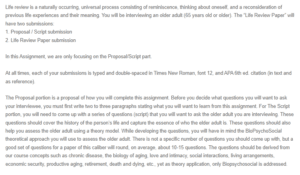Proposal/Script – Life Review Paper
When I was younger, I avoided elderly people as much as I could. I perceived them as grumpy and people who complained about everything and anything. It has taken years of growing up and taking this course to erase the bias I once held. I have come to learn that elderly people can, and some do, suffer from depression as well as other comorbidities that could be a cause for irritability and bad moods. I say ‘could’ because I do not know for certain why some elderly people seem irritable while others seem to be bubbly. Hence, the main information I would like to get from this project is to find out what causes the elderly to be irritable or otherwise.
The subject I interview will offer me the opportunity to inquire into the world of the elderly. I intend to ask the subject questions that will help me zero in on what makes the elderly irritable. I will, of course, not make any assumptions that the subject is irritable, as that would be stereotyping. Instead, I will ask questions as regards her mental state, psychological state, emotional, and physical state. The next level of questions will be geared toward indirectly finding out whether my subject is often irritable, why, and at what times they experience the said irritability. I will also do the same for times when the subject feels happy and content. The Profile of Mood States 2nd Edition–Adult (POMS 2–A) is the assessment tool that would be used to base the questions that the subject will be asked. This tool is a self-reporting assessment of a person’s mood and can be adapted to capture fluctuating and transient feelings. It also assesses relatively enduring affect states in individuals above the age of 18 years. The results of the test contribute to an assessment that is comprehensive and which indicates a potential mood disturbance (Lin, Hsiao, & Wang, 2014).
Script Questions
- Do you face any peer pressure?
- Do you have more true friends?
- Do you still have some of your old friends?
- Do you get lonely?
- What can’t you do that you previously were able to do?
- Do you have any life regrets?
- What do you wish you had done with your health while younger?
- What would you not eat if you could turn back the hands of time?
- Do you look forward to getting older?
- What are your hobbies?
- Do you have hidden grudges and resentment?
- What has love done for you, and what is your opinion on love?
- Are you broke? If so, what do you wish you had done? If not, what do you wish you could have improved on financially?
References
Lin, S., Hsiao, Y., & Wang, M. (2014). Test Review: The Profile of Mood States 2nd Edition. Journal of Psychoeducational Assessment, 32(3), 273-277. https://doi.org/10.1177/0734282913505995
ORDER A PLAGIARISM-FREE PAPER HERE
We’ll write everything from scratch
Question

Proposal Script – Life Review Paper
Life review is a naturally occurring, universal process consisting of reminiscence, thinking about oneself, and a reconsideration of previous life experiences and their meaning. You will be interviewing an older adult (65 years old or older). The “Life Review Paper” will have two submissions:
1. Proposal / Script submission
2. Life Review Paper submission
In this Assignment, we are only focusing on the Proposal/Script part.
At all times, each of your submissions is typed and double-spaced in Times New Roman, font 12, and APA 6th ed. citation (in text and as reference).
The Proposal portion is a proposal of how you will complete this assignment. Before you decide what questions you will want to ask your interviewee, you must first write two to three paragraphs stating what you will want to learn from this assignment. For The Script portion, you will need to come up with a series of questions (script) that you will want to ask the older adult you are interviewing. These questions should cover the history of the person’s life and capture the essence of who the elder adult is. These questions should also help you assess the older adult using a theory model. While developing the questions, you will have in mind the BioPsychoSocial theoretical approach you will use to assess the older adult. There is not a specific number of questions you should come up with, but a good set of questions for a paper of this caliber will round, on average, about 10-15 questions. The questions should be derived from our course concepts such as chronic disease, the biology of aging, love and intimacy, social interactions, living arrangements, economic security, productive aging, retirement, death and dying, etc., yet as theory application, only Biopsychosocial is addressed.

